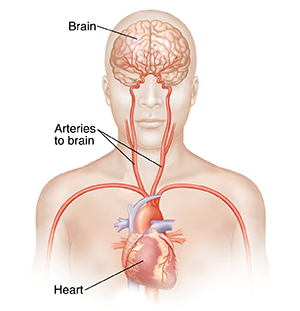What is Syncope?
What is Syncope?

Understanding heart rate and blood pressure changes
Your brain and body need a steady supply of oxygen-rich blood. Your heart rate and blood pressure adjust to maintain this steady supply throughout all your activities.
The heart creates electrical signals that travel through it on pathways. These signals set the heart rate, and tell the heart when to pump blood.
In response to your body’s needs, your brain may also trigger changes in your heart rate and blood pressure. There are sensors in the body that detect the amount of blood flow going to the brain and other parts of the body. If these sensors detect low blood flow, they signal the body to increase the amount of fluid in the blood vessels and increase the heart rate to provide more circulation.
The blood leaving the heart with each contraction supplies oxygen and nutrients as it circulates in your brain.
Warning signs
Syncope often happens suddenly. Some warning signs, including dimmed, blackened, or tunnel vision, lightheadedness, sleepiness, or a rapid heartbeat. Some people may feel nauseous or sweaty as well. However, you may have no warning signs at all. After syncope, you recover quickly, but you may feel tired. Do not drive if you are having warning signs that you may faint.
Is it serious?
Syncope is a common problem with many possible causes. Often these causes are not serious. For instance, syncope can be caused by standing for too long or sitting up too fast. In some cases, you may never faint again. However, syncope in the setting of heart abnormalities can be a warning sign of more serious underlying problems. For this reason, your healthcare provider may order several tests to evaluate heart function and rhythm. If you have had syncope, call your healthcare provider to arrange an evaluation.
In older adults, syncope may be a sign that a heart attack has happened. Do not delay seeking treatment.
Even if the cause of syncope is not serious, there is a risk of injury with falling during loss of consciousness. When possible, finding a cause can improve your safety and reduce risk of injury.
Updated:
March 21, 2017
Sources:
Evaluation of syncope in adults, Up To Date, Pathogenesis and etiology of syncope, Up To Date
Reviewed By:
Image reviewed by StayWell medical illustration team.,Kang, Steven, MD,Snyder, Mandy, APRN